As responsible clinicians, we have a practical obligation to collect and analyze therapeutic data from our patient base. This data helps us provide a better and more individualized treatment plan for our patients, and also lets us see data from an aggregate view so we can gauge results of a group as a whole.
Each patient within our practice receives various health questionnaires and surveys on a regular basis within our intake form packets. While our paperwork may seem extensive, we believe comprehensive health records are the best defense against patient disqualification.
Some of this data we collect is demographic in nature and tells us things like average patient age (53 years) and our largest cities of residence for patients (Venice, North Port, Sarasota). We can also see that our patient base is 49.5% male and 50.5% female, and that the majority of our patients (53.4%) are married.
A month ago we implemented an anonymous patient survey to better understand the effects patients had experienced – positive or negative – once they began cannabis treatment.
On June 8th, we sent a survey link to patients we’d first seen in January and February. These patients had already vested their 90-day establishment periods within the practice and mostly had gotten approvals for their applications, meaning many had begun their therapy. This link was sent to over 300 patients, and nearly 30 percent posted responses.
Below are breakdowns of that particular data.
The Application / OCU Experience
The majority of respondents had completed their medical cannabis state ID card applications (94.3%) and had reported receiving approval (75.7%). Most surprisingly, 42.9 percent of respondents reported as having “strongly positive” experience with Florida’s medical cannabis application process.
Within the survey, we included a text box for people to include additional comments about their experiences. Some used the opportunity to express their displeasure:
I mailed my check on May 6th and it hasn’t been cashed yet. No info is available, no returned calls when message left. I’m just lucky I don’t have something like cancer because I very well may be dead before I get my card.
They are unreachable. Never return calls. Super behind on their processing rates took almost a month and some odd days to even get approval. Horrible service.
They are not compassionate. They do not answer the phone nor return messages. I did not send proof of residency with my application. The office did not email, telephone, send a letter nor any kind of communication to tell me this. Only by accident did I figure this out. When I uploaded the proof, I got an approval and card ID within 15 minutes. There communications is the worst.
Others used the text box to express their gratitude:
They are under staffed. Somewhat frustrating that after 90 days, add another 40 days for processing. That noted, with a small staff, they did get the job done.
Positive experience but the process is very slow.
The process seemed to work.
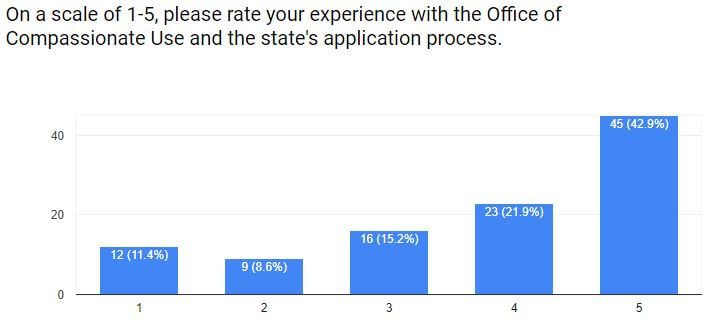
The Dispensary Experience
Because we have little to do with any patient processes outside of our office, we felt it was vitally important to ask about their experiences with the dispensing organizations (now called medical marijuana treatment centers or MMTC’s). 91.8 percent of patients surveyed called Trulieve first and 86.9 percent of patients purchased cannabis products from them. Knox and Surterra tied for second place in orders, both at 13.1 percent.
The largest group of purchasing patients (34.7%) reported spending $101 – $250 on medication as of the date of their submission. Nearly a third of patients (30.6%) responded they’d spend between $251 and $500 on medication from dispensaries.
With 87.9 percent of patient admitting to making a purchase, inhalation products (vape or concentrate) are the most popular class of product consumed in this survey. Tinctures and oil suspensions tied for second most-popular delivery method (27.3%), and capsules came in third with 22.7 percent of patients reportedly purchasing them.
In another text box, patients shared their dispensary experiences:
Trulieve representative that delivered product was a very loud talking man which I believed disturbed my neighbors in my condo. Reps at Knox weren’t very informed about their products especially what kind of oil they contained.
Surterra representatives are very helpful, especially since this was my first time. They were patient and efficient. I had my medicine delivered and can’t say enough about the two gentlemen who delivered my meds. They were so professional and wanted to be sure I knew how to use the vape pen. They showed up in an unmarked car, wearing professional ‘uniforms’ (nice T-shirts), with the Surterra emblem. They also wore ID cards. I offered to tip them, but they would not take it. Great place to refer patients to and hopefully in future they’ll have more products.
I had experience in another state at one of their dispensaries. Employees here all seemed to be in training. They were helpful but didnt fully inspire confidence.
Trulieve has excellent customer service. Surterra was to call me back, but never did.
VERY displeased with Knox. Generally pleased with Trulieve. I made an in-person visit to Trulieve in Clearwater and phone only with Knox. Knox has refused to return my calls, despite repeated requests to hear from management.
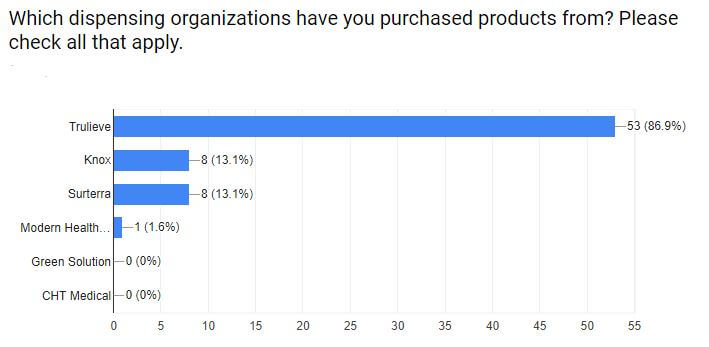 Cannabis as a Medicine
Cannabis as a Medicine
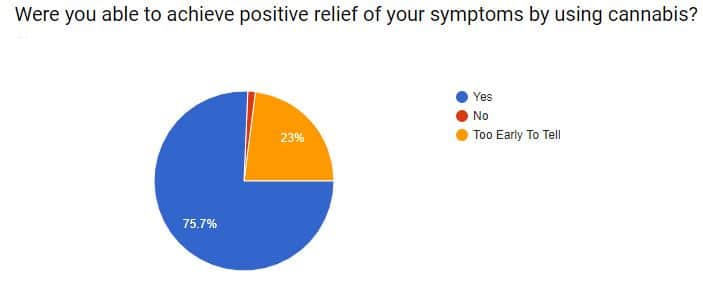 While all data in relation to cannabis as a medicine is helpful, the most important information we’ve been able to ascertain from this particular survey relates to the efficacy of cannabis in the treatment of various illnesses.
While all data in relation to cannabis as a medicine is helpful, the most important information we’ve been able to ascertain from this particular survey relates to the efficacy of cannabis in the treatment of various illnesses.
Three quarters of survey respondents (75.7%) reported achieving positive relief of their primary symptoms by integrating cannabis into their daily routines. 23 percent reported that it was too early to tell what positive effect cannabis was having. Only one respondent reported no positive relief.
Our survey results also showed a great deal of hope in the treatment. 100 percent of our patients reported feeling cannabis would help them achieve a greater sense of well being, with the largest proportion (66.7%) admitting they strongly believed in this increased sense of wellness.
Well over half of respondents (52.9%) said they believed cannabis therapy had greatly increased their quality of life, with 31.4 percent reporting a moderate increase and 13.7 percent reporting a slight increase.
Pharmaceuticals
Any commercially produced medication has a different side effect profile and combinations of drugs can greatly reduce the quality of life of the patient having to take them. Since our patients have begun to utilize cannabis, we’ve been shocked at the number of pills patients have been able to reduce from their daily routines.
These reductions are plainly apparent in our patient survey, with 80 percent of respondents reporting reductions in prescription medications after starting cannabis. Benzodiazepines such as Xanax, Valium, and Klonopin lead the pack with a 41.8 percentage reduction in use. Anti-inflammatory drugs and non-narcotic pain relievers were reported at a 34.3 and 31.3 percentage reduction, respectively. 28.4 percent of patients reported reductions in opiate narcotics.
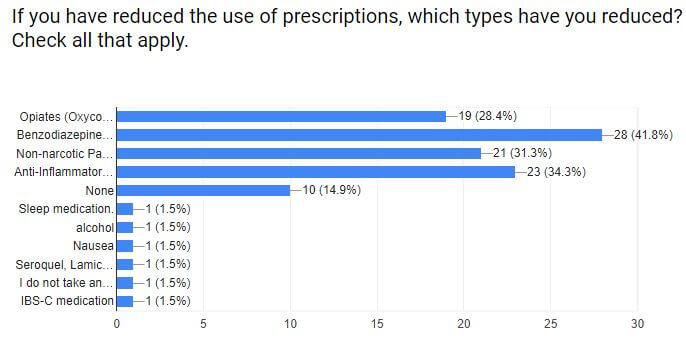 Direct Comments From Patients
Direct Comments From Patients
We asked patients for additional comments related to their therapy and their senses of well being:
Helped with migraines and sleep apnea as well as Crohn’s.
Eye pressures reduced considerably.
I am more relaxed and sleeping better.
I feel my life has changed for the better forever. i have found instant relief from extreme stress and anxiety and the ability to sleep without the nasty prescriptions which have been given to me for years. i always knew what helped me it’s extremely gratifying to realize I’m not alone in my beliefs.
Feeling less pain helps me feel better even though it’s always present.
I sleep better than I have in years.
Pain subsides greatly.
Thankful to finally get this support and relief!
I have not had any spasms in my abdomen since using the capsules.
My migraines and stress and neck tension (which are triggers that bring them on) are much better already. I have also been able to lower my blood pressure medication. I have not had an eye pressure test yet but hoping for better results with that also.
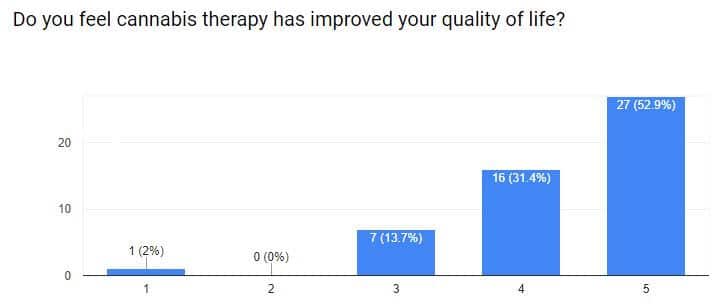
In Conclusion
While the sample size is small (only about a fifth of our total patient base), the results of this initial active patient survey are encouraging. The data confirms what we see anecdotally on a daily basis. People are going up to the dispensaries, purchasing products, and are reporting mostly positive results – not just in relief of their symptoms, but also in their quality of life.
More data is necessary and we will continue to survey our patients in this fashion on a monthly or bi-monthly data.

